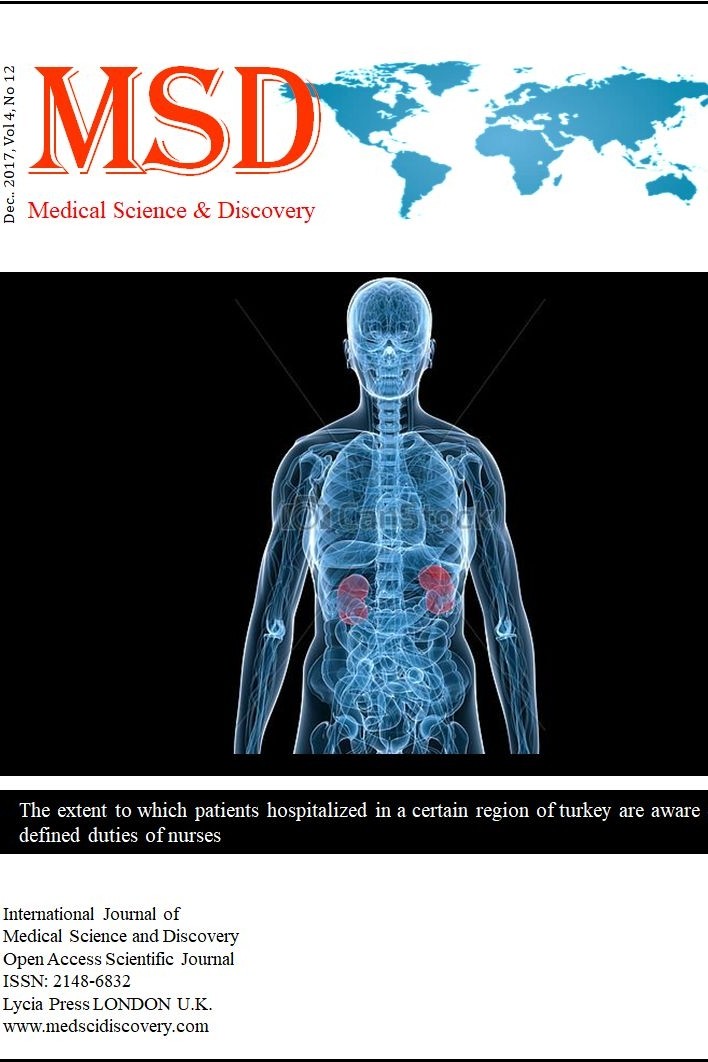Investigation of Serum Enzyme Activity of Nitric Oxide (NO), Arylesterase (ARE) and Paraoxanase (PON) in Renal Tumors
Investigation of Serum Enzyme Activity of Nitric Oxide (NO), Arylesterase (ARE) and Paraoxanase (PON) in Renal Tumors
Objective: Reactive oxygen species (ROS) and antioxidant capacity have been implicated in the pathogenesis of various diseases, and cancers. Oxidative stress can cause tumor angiogenesis and may be carcinogenic. However, the relationship between antioxidant capacity and various cancers has been researched in several clinical trials. Materials and Methods: In this study, we aimed to identify serum Nitric Oxide (NO), Arylesterase (ARE) and paraoxonase (PON) activities in patients with renal tumors. Serum ARE, PON and NO levels were measured by spectrophotometer. Results: Increased activity of serum nitric oxide (NO) was determined in cancer group. Serum Arylesterase (ARE) were significantly lower in the patient group than the control group. Increased activity of Serum paraoxonase (PON) were detected in the control group (p < 0.05). Conclusion: Our results indicates that Nitric oxide (NO), arylesterase (ARE) and paraoxonase (PON) activities may play an important role in the pathogenesis of renal cell cancer.
Keywords:
ARE, NO, PON, Arylesterase, Nitric Oxide, Serum paraoxonase, Renal tumor,
___
- 1. Curti BD, Renal cell carcinoma. JAMA,. 292, 97–100 (2004).
- 2. Chow WH, Devesa SS, and Warren JL et al., JAMA, 281,1628–31(1999).
- 3. Dhote R, Pellicer-Coeuret M, Thiounn N, et al., BJU Int.86: 20–7 (2000).
- 4. McLaughlin JK, Blot WJ, Devesa SS et al., Renal cancer. In: Schottenfeld D and Fraumeni JF (eds) Cancer Epidemiology and Prevention. New York, NY: Oxford University Press, pp. 1142–55 (1996).
- 5. Templar J, Kon SP, Milligan TP, et al., Nephrology Dialysis Transplantation 14, 946–51(1999).
- 6. Batcioglu K, Mehmet N, Ozturk IC, et al., Cancer Invest. 24, 18–21(2006).
- 7. Nishikawa M, Cancer Lett, 266, 53–9 (2008).
- 8. Ray G, Batra S, Shukla NK et al., Breast Cancer Res Treat.59:163–70 (2000).
- 9. Wang GQ, Dawsey SM, and Li Y, Cancer Epidemiology, Biomarkers and Prevention, 3,161–66 (1994).
- 10. Oberley LW, and Buettner GR, Cancer Research 39: 1141–9 (1979).
- 11. Gecit I, Aslan M, Gunes M, et al., J Cancer Res, Clin, Oncol., 138: 739–43 (2012).
- 12. Cortas NK, and Wakid NW. Clin. Chem., 36, 1440-1443 (1990).
- 13. Erel O. Clin. Biochem, 37, 112–229 (2004).
- 14. Erel O, Clin. Biochem, 38, 1103–1111 (2005).
- 15. Gülçin I, Oktay M, Küfrevioǧlu, ÖI, and Aslan A, Journal of Ethnopharmacology, 79 (3), 325-329 (2002).
- 16. Jaruga P, Zastawny TH, Skokowski J, et al., FEBS Lett. 341(1),59-64 (1994).
- 17. Sun Y, and Oberley LW, Free Radical Free Radic, Biol, Med. 21: 335–48 (1996).
- 18. Blackburn RV, Spitz DR, Liu X, et al., Free Radic Biol, Med, 26, 419–30 (1999). 9) Toyokuni S, Okamoto K, Yodoi J, et al., FEBS Lett.16, 3581–3 (1995).
- 19. Meyer TE, Liang HQ, Buckley AR, et al., International Journal of Cancer 3: 55–63 (1998).
- 20. Mantovani G, MaccioA, Madeddu C, et al., International Journal of Cancer 98: 84–91 (2002).
- 21. Szatrowski TP, and Nathan CF, Cancer Res. 51, 794–8 (1991).
- 22. Marnett LJ, Mutat Res 424, 83–95 (1999).
- 23. Seven A, Civelek S, Inci E, et al., Clinical Biochemistry, 32, 369–73 (1999).
- 24. Marnett LJ, Carcinogenesis. 21, 361–370 (2000).
- 25. Vo TKO, Druez C, Delzenne N, et al., Carcinogenesis. 9(11), 2009–2013 (1988).
- 26. Corrocher R, Casaril M, Bellisola G, et al., Cancer, 58(8), 1658–62 (1986).
- 27. Nakada T, Akiya T, Koike H et al., Eur Urol, 14(1), 50–5 (1988).
- 28. Ozturk HS, Karaayvaz M, Kacmaz M, et al., Cancer Biochemistry Biophysics, 16, 157–168 (1998).
- 29. Ferraris AM, Rolfo M, Mangerini R, et al., Am J Hematol., 47, 237–278 (1994).
- 30. Farber CM, Kanganis DN, Liebes LF, et al., Br J Haematol 72, 32–35 (1989).
- ISSN: 2148-6832
- Başlangıç: 2014
- Yayıncı: Zafer AKAN
